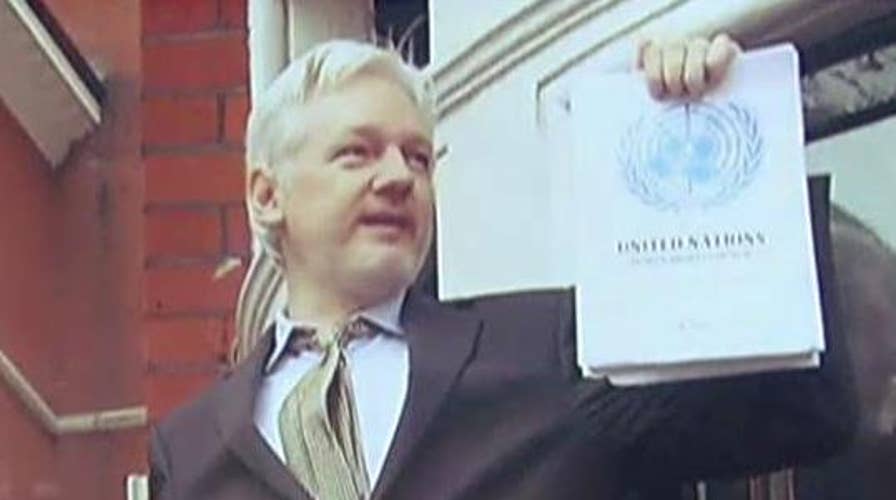Ecuador's government acknowledged Tuesday that it has "temporarily restricted" internet access at its embassy in London for WikiLeaks founder Julian Assange after the website published a trove of documents from Hillary Clinton's presidential campaign.
The foreign ministry said in a statement that while it stands by its decision in 2012 to grant Assange asylum in London, it doesn't interfere in foreign elections or "support a candidate in particular."
The ministry didn't specify the extent of the restrictions on Assange's internet access, saying only that the restrictions on his communications wouldn't affect WikiLeaks' ability to carry out its journalistic activities.
Leftist President Rafael Correa's government said it was acting on its own and not ceding to foreign pressures.
On Monday, the group tweeted: "We can confirm Ecuador cut off Assange's internet access Saturday, 5pm GMT, shortly after publication of Clinton's Goldman Sachs (speeches)." In follow-up messages posted Tuesday, the group claimed U.S. Secretary of State John Kerry had personally intervened to ask Ecuador to stop Assange from publishing documents about Clinton. Citing "multiple US sources," WikiLeaks said the request was made on the sidelines of negotiations which took place last month in Colombia.
The State Department denied the allegation.
"While our concerns about Wikileaks are longstanding, any suggestion that Secretary Kerry or the State Department were involved in shutting down Wikileaks is false," U.S. State Department spokesman John Kirby said in an email to the Associated Press. Speaking to reporters later, deputy spokesman Mark Toner said Kerry never even raised the issue or met with Correa during his visit to Colombia.
"There just was no meeting," he said. "They didn't discuss any of this stuff."
Even after cutting off internet access, WikiLeaks managed on Tuesday to release more emails purportedly part of a trove of 50,000 messages stolen from the gmail account Clinton’s campaign chairman, John Podesta
According to newly published emails, former first daughter Chelsea Clinton discovered and shared wide-ranging allegations involving conflict-of-interest concerns involving the The Clinton Foundation when her mother launched her presidential bid last year.
Experts contacted by FoxNews.com said there may be a variety of ways WikiLeaks could continue to release documents even with Assange's Internet access gone, from forms of communication that don’t involve the Internet to a dead-man’s switch.
“The simplest explanation is that the rest of WikiLeaks has access to unreleased documents, online accounts, and servers, and a protocol to operate if they cannot communicate with Assange,” Shuman Ghosemajumder, the CTO at Shape Security, told FoxNews.com in an email.
It’s unclear just how Ecuador cut off Assange’s Internet access, so it’s possible the WikiLeaks founder still has some form of connection, Ghosemajumder speculated.
The could be “something as simple as connecting to an external WiFi access point, to using a MiFi connection, to having access to a telephone and using dialup,” he said.
And even without Internet access, there are still ways to get a message out to the rest of his organization, Ghosemajumder pointed out, writing that “if he is able to communicate with the external world in any way, he can at least give the rest of WikiLeaks instructions.”
If Assange is being cut off from the internet for diplomatic reasons, it may be due to Correa's politics. The leftist politician recently told the Moscow-backed RT broadcaster that he'd prefer Clinton over Trump.
"For the United States, I'd like the winner to be Hillary, whom I also know personally and appreciate very much," Correa said.
Marc Becker, a professor of Latin American history at Truman State University in Missouri, told the AP that while Clinton had successfully pulled Correa into her orbit during her tenure as secretary of state, he doubted Ecuador had merely bowed to U.S. pressure. He ventured that Correa's government opposes the idea of interfering in another country's affairs "and doesn't appreciate their guests using their resources to that end."
Assange originally fled to the Ecuadorean Embassy on June 19, 2012, after a drawn-out and ultimately unsuccessful legal battle to being sent to Sweden, where he remains wanted over an allegation of rape.
Ecuador granted him asylum, but British authorities have made clear they would arrest him if he tried to leave. London's Metropolitan Police used to maintain a visible presence outside the building, although officers were nowhere in sight when an AP journalist visited on Tuesday.
The Associated Press contributed to this report.

